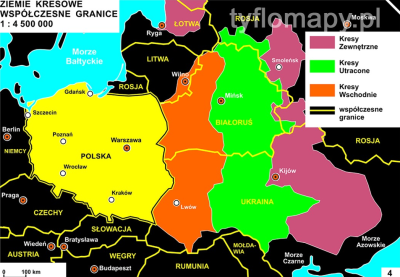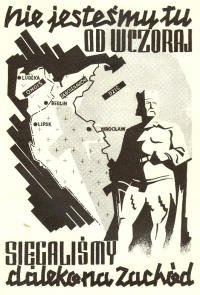Polish irredentism encompasses the belief that certain territories not currently under Polish jurisdiction have historical, ethnic, or legal ties to Poland and should be reclaimed. This sentiment presents a range of claims and ideal borders, with variations dependent on individual perspectives. These claims can be broadly categorized into several prevailing concepts. The "Kresy Idea" centers on eastern territories, invoking the term "kresy" in Polish which translates to "borderlands." The "Recovered Territory Idea" pertains to regions such as Pomerania, Lubusz, and Silesia, with a focus on maintaining control of these areas in opposition to German irredentism. The "Saxony Claim" draws connections to the Polish-Lithuanian Commonwealth and its historical links. The "Cieszyn Reunification" emphasizes the Czech side of the Cieszyn area. The "Western Pomeranian Reunification" advocates for areas like Griefswald that were once part of the Pomerania province. The "Polabian Idea" underscores the Polish-Polabian historical connection. The "Curonian Legacy" invokes Polish claims on territories such as Latvia, Tobago, and Gambia, reflecting the Polish-Lithuanian Commonwealth's historical presence. Lastly, the "Madagascar Claim" addresses Polish historical interests in Madagascar.
 Kresy Idea
Kresy Idea 

The concept of the Kresy idea, sometimes referred to as the Kresy myth or the Eastern Borderlands, exhibits variations across different voivodeships and regions within the Kresy, with each iteration stemming from its historical origins dating back to the Polish-Lithuanian Commonwealth. In contemporary times, modern Irredentists predominantly associate the Kresy with the eastern Polish territories owned during the interwar period, often denoted as "Kresy Wschodnie" or the eastern borderlands. Claims over the Belarussian segment of the Kresy are often predicated on ethnic factors, particularly as many of the territories with Belarusian ownership have a majority Polish population. Similar considerations apply to the Lithuanian Kresy. Concerning the Ukrainian Kresy, arguments for Polish ownership pivot more on questioning the organic nature of the Ukrainian identity itself, positing it as a constructed identity by the Hapsburg Empire in the 1880s as part of geopolitical maneuvering. Additional justifications for Polish ownership encompass historical precedents, such as Lwów and its environs having been under Polish control for over 400 years, surpassing any other historical ownership. Another angle pertains to the post-1945 border adjustments, contending that the changes were illegitimate, although they were sanctioned by the Soviet Union, USA, UK, and the Polish puppet government; the Government in exile purportedly acceded to these changes under duress due to their diminished influence.
Other, more radical manifestations of the Kresy idea irredentism indeed exist, notably encompassing concepts such as "kresy utracone," which translates to "Lost Borderlands," alluding to the eastern frontiers of the Polish-Lithuanian Commonwealth post the Treaty of Andrusovo, and "kresy zewnętrzne," or "Exterior Borderlands," signifying the eastern borders after the Truce of Deulino. The arguments advocating for the ownership of these territories are less prevalent, often entwined with imperialistic aspirations for the civilization of the East and similar national schizophrenias. The thesis of the inorganic nature of Ukraine's identity can also be extended to the southern territories of kresy zewnętrzne and kresy utracone.
 Recovered territory Idea
Recovered territory Idea 

The Recovered Territories, alternatively known as the Western Borderlands or Regained Lands, pertain to the former eastern territories of Germany and the Free City of Danzig that were assimilated into Poland following World War II. This successful implementation of irredentism took place in 1945, resulting in Poland acquiring substantial territories from Germany, even those without a predominant Polish ethnic majority. The displacement of the German populace occurred, leading to the polonization of these territories. Prior to the border alteration, the foundation for Polish ownership of these lands rested upon two main aspects. Firstly, a historical rationale was presented, highlighting that these lands were historically governed by the Duchy of Poland and later the Kingdom of Poland under various dynasties. This control persisted even after the Holy Roman Empire took possession of these territories subsequent to the Piast collapse. Notably, Silesia was ruled by Polish dynasties until being eventually taken by the Habsburgs and Pomerania was ruled by the Polish-Kashubian Gryf dynasty until it was partitioned by Prussia and Sweden. Secondly, an ethnic argument emerged, applicable to Upper Silesia, Warmia, and Masuria, where a majority of the population was ethnically Polish within Germany. Today, while the historical basis endures, the ethnic argument has been extended to encompass the entirety of the Recovered Territories. Moreover, Poland's substantial development of these regions since 1945 further justifies its claim to ownership.